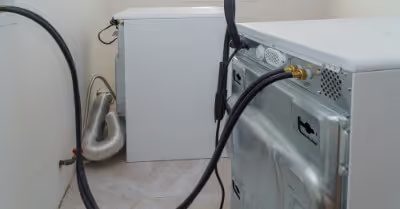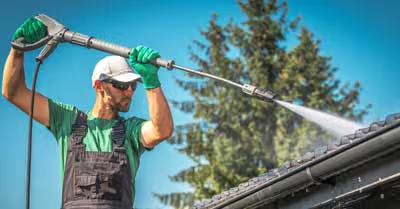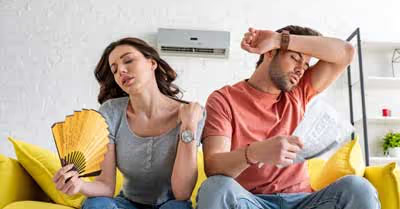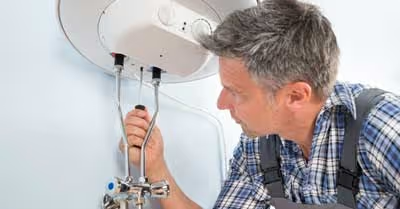Table of Contents
Get To Know Your HVAC System
Before we get into the possible answers to the question "why is my HVAC so noisy?", you should be familiar with what makes up your home's HVAC system. Knowing some basics about your equipment will help you understand any possible problem your air conditioning system might have before you call a professional.
A well-functioning HVAC system depends on regular maintenance. With the years, your cooling and heating system might experience several problems, caused, for instance, by low refrigerant, worn condenser, and blown fuses. Only with regular preventive maintenance, you'll be able to spot the faults as soon as possible and prevent them from becoming more concerning (and costly) problems.
Depending on your energy use, the local costs for gas and oil, and the efficiency of the equipment of your HVAC system, different systems might suit your home better. As long as you have a properly installed and sized system, cost-efficiency and comfort will not be a problem for you.
Why You Shouldn't Ignore Noise Coming From Your HVAC
It is not uncommon for homeowners to have to deal with noisy HVAC systems. But before worrying too much, you must be aware of the difference between standard noises and unusual ones. If your HVAC system is emitting weird or louder noises, it might be the sign of issues affecting your heating and cooling system. For this reason, you should not ignore the sounds coming from your HVAC.
Instead of asking yourself the question "why is my HVAC so noisy" without taking action, you must call a professional as soon as you notice some unusual noise: it will avoid expensive reparations.
Noises Coming From The HVAC System That Should Not Concern You
As we mentioned early, you must familiarize yourself with your HVAC system. That way, you'll have an idea of what kinds of sounds you should expect from the system when properly working.
For example, a "standard" noise you are most likely to hear from your system is the continuous but quiet humming coming from the motor of the unit located indoors.
Keep in mind that every HVAC system consists of indoor and outdoor units. The fan and motor of outdoor units tend to be noisier than the indoor units.
A quiet swoosh coming from the system as the air passes through the vents is a noise that you'll be hearing coming from your HVAC system: don't worry about that.
Also, don't be alarmed if you hear a thump or a quiet squeal from time to time: it is the clear sign your system is cycling on and off. In general, all you need to do is to tune the system up.
What Are The Causes of Some "Common" Unusual Noises?
Now that you are aware of "normal" noises that might come off your HVAC system, it is time to learn how to identify unusual noises. Every time you notice some weird sounds that make you wonder "why is my HVAC so noisy?" you must know how to identify the source of the problem.
Use the following guidelines to learn what the problem might be and to find a quick solution to the possible issue that might affect your system.
If The Noise Comes From The Indoor Unit
One of the most common complaints regarding noises when it comes to the HVAC system concerns the air handler or the furnace of the indoor unit. When you hear weird sounds coming from the indoor unit, the cause is mostly a bad belt or a fault in the motor regulating the blowing of air. On the other hand, if you hear rattling or banging sounds, the problem has to do with faulty furnaces. Such noises are the signal the equipment is not working as it should.
With such noises coming from the indoor unit, you can expect to deal with rather inexpensive repairs, such as the addition of lubricant, the replacement of belts, or tightening some parts.
On the other hand, when you hear constant clicking, the issue is most probably coming from the thermostat. Repeated clicking stands for a fault of communication between the capacitors and the thermostat, which causes the system to fail when you try to start it. In this case, the repair would be a bit more expensive. Make sure you call a professional to help you solve the problem.
If The Noise Comes From The Outdoor Unit
Whether we are talking about an air conditioner or a heat pump, if you hear a loud rattle, the cause is most properly the accumulation of debris (commonly branches) in the fan. Don't worry: it is common for small debris to make the way inside the grate that protects the exhaust fan.
As soon as you notice or suspect something to be stuck in your outdoor unit, you must immediately turn off the power. Check whether there is indeed any obstruction and check for bent metal or any damage to moving parts. If you can, take the stuck debris away and inspect for any other issues to the equipment. If you can't clean the fan or if you notice other problems to the system's parts, make sure you call an experienced professional.
Keep in mind that most units include an isolation padding whose purpose is to absorb some of the noise produced by the movement of the fan. With time, such pads might wear over, which will produce louder sounds. Make sure you are giving your HVAC system regular maintenance.
When The Noise Is Coming From Vents Or The Registers
Remember when we mentioned that hearing a quiet swoosh caused by the air moving through the registers and the vents? Anything louder than that is a sign of some malfunction in the system.
For instance, a hissing noise might stand for damage to coolant lines or leaks. When you hear vibrations coming from the vents, the cause might be the obstruction of some of the vents and a lack of air flowing. Don't underestimate such noises, because they can also be the sign of more concerning problems, such as improper installation.
Hissing Noises From The Ductwork
It is normal to hear a quiet rush of air. However, when you start hearing a hiss, the reason is most probably a leak in the ducts. In this case, you should call a professional who will take a look at your HVAC and possibly seal the ducts
Another cause of hissing might come from the compressor motor when you turn off the heat pump. The reason for such a notice is usually a leak in the refrigerant valve.
Too Much Static Pressure
Some HVAC systems might have too much static pressure, which causes the ducts not to accommodate the volume of air getting into the system. When the air coming in exceeds the capacity of the tubes, you'll start hearing loud noises. Usually, there are several ways you can solve this kind of problem:
- You can adjust the speed of the fan which will result in less airflow
- You can add some ductwork to decrease the static pressure (installing larger duct can be a good idea)
- Add or expand registers to increase the return air (and cut down on the noise)
- Switch to high-speed registers to allow more airflow and lower the static pressure.
Prolonging The Life Of Your HVAC System
HVAC systems are costly. Here are some tips you should be following to prevent some issues, prolong the life of your HVAC, get the most out of your investment while reducing any noises coming from your HVAC.
Make A Commitment to Cleaning And Check-Ups
Keep your system clean to avoid the accumulation of debris and ensure a smoothly running system. Clean it regularly and check it in the spring and the fall: you'll be able to spot any problems before they get bigger.
Check The Air Filters and Inspect the Equipment
You need to regularly inspect your HVAC system to avoid small problems to turn into costly reparations. You can check for corrosion, leaks, wear, and tear. Call a professional for closer inspection. Don't do the work yourself as you might get into deeper trouble.
Give The System A Break From Time To Time
An HVAC system cannot handle working 24/7 for long. If you want to prolong its life, apply a programmable thermostat that will adjust the temperature at night and when you are not home.
The Problem Of Central Return
Smaller houses have a system infrastructure that might make it harder to reduce the noise. Condos and apartments tend to have an air handler installed and connected to the central return. Such systems are more challenging to quiet because there is almost no space for additional ductwork. If you live in such a home, finding solutions for your noisy HVAC system can be much harder (but not impossible!)
Recent Articles
















